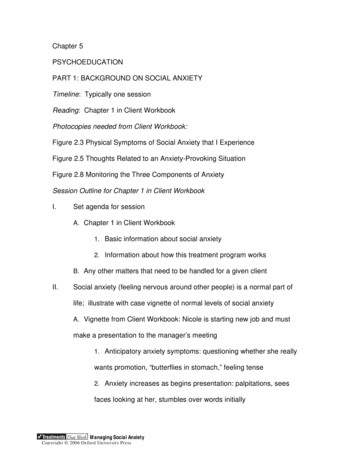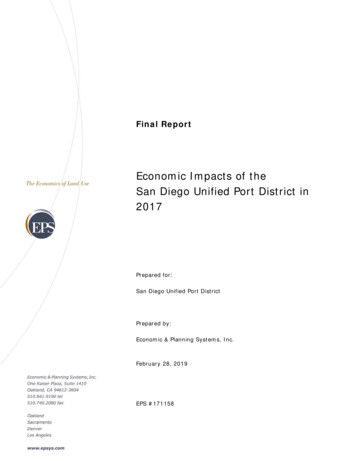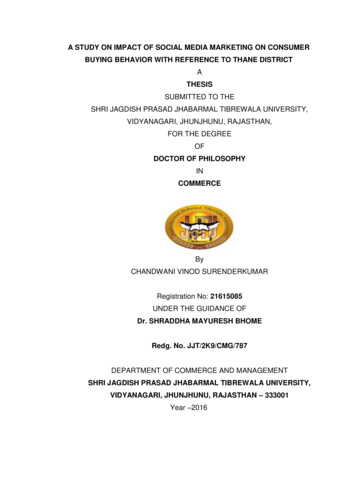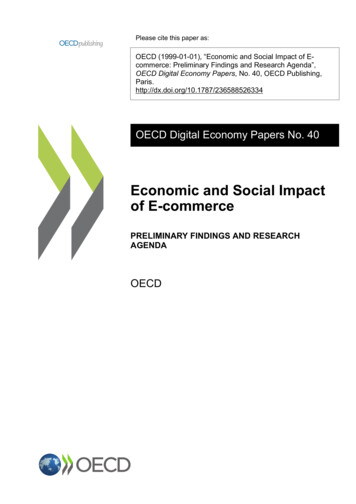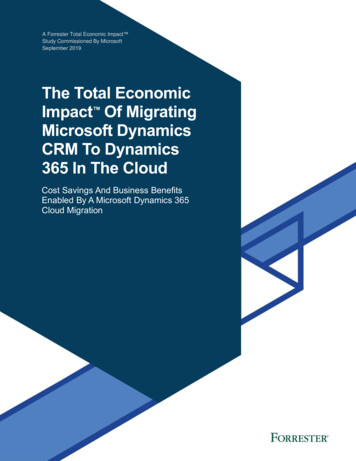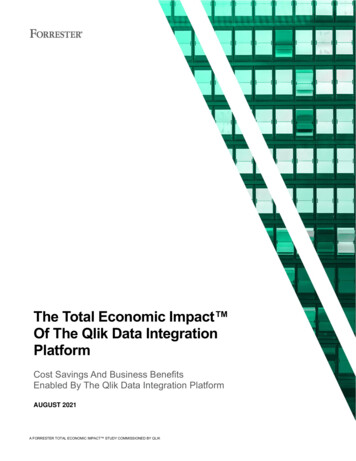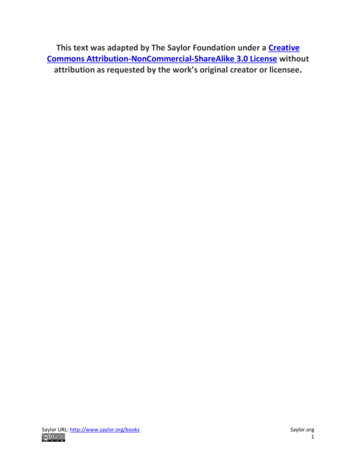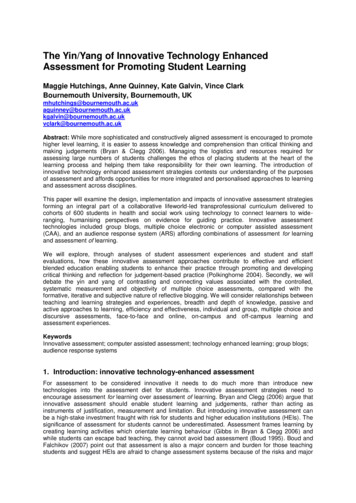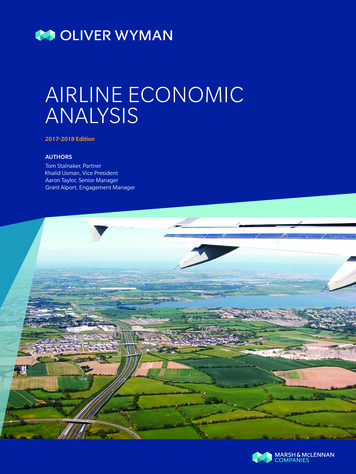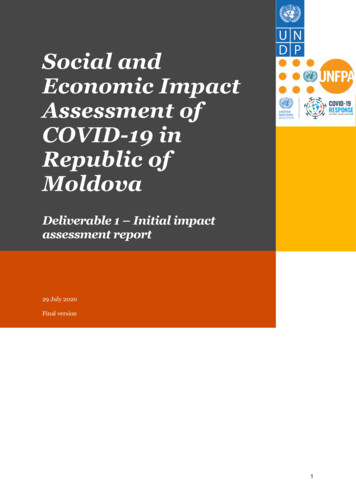
Transcription
www.pwc.Social andEconomic ImpactAssessment ofCOVID-19 inRepublic ofMoldovaDeliverable 1 – Initial impactassessment report29 July 2020Final version1
Important message to any person not authorized to have access to this reportAny person who is not an addressee of this report or who has not signed and returned toPricewaterhouseCoopers Management Consultants SRL a Hold Harmless Letter, is not authorised tohave access to this report.Should any unauthorized person obtain access to and read this report, by reading this report suchperson accepts and agrees to the following terms:1.The reader of this report understands that the work performed by PricewaterhouseCoopersManagement Consultants SRL was performed in accordance with instructions provided byour addressee client and was performed exclusively for our addressee client’s sole benefitand use.2. The reader of this report acknowledges that this report was prepared at the direction of ouraddressee client and may not include all procedures deemed necessary for the purposes ofthe reader.3. The reader agrees that PricewaterhouseCoopers Management Consultants SRL its partners,directors, employees and agents neither owe nor accept any duty or responsibility to it,whether in contract or in tort (including without limitation, negligence and breach ofstatutory duty), and shall not be liable in respect of any loss, damage or expense ofwhatsoever nature which is caused by any use the reader may choose to make of this report,or which is otherwise consequent upon gaining of access of the report by the reader. Further,the reader agrees that this report is not to be referred to or quoted and not to distribute thereport without prior written consent of PricewaterhouseCoopers Management ConsultantsSRL.Drafted byMonica Gherase-Toader2
To: Andrea CuzyovaUnited Nations Development Programme – Istanbul Regional HubMerkez Mahallesi, Abide-i Hürriyet CdNo:142, 34381 Şişli/İstanbul, Turkey29th of July 2020Dear Sir/ Madame,This report has been prepared by PricewaterhouseCoopers Management Consultant SRL (“PwC”) forUnited Nations Development Programme (“UNDP”) under the terms of the Task Order number 17under the Long Term Agreement UNDP-IRH-CS-2018-01 Strategic Consultancy Services (the“Contract”) and its contents are strictly confidential.This report has been prepared for the purposes of “Social and Economic Impact Assessment ofCOVID-19 in Republic of Moldova”.The assignment was carried out from 21.05.2020 to 24.07.2020. Our work included: interviews andmeetings with Client’s management and with stakeholders, analysis of documentation, desk researchetc.We draw your attention to important comments regarding the scope of our work, the purpose forwhich the advice is to be used, our assumptions and limitations in the information on which theadvice set out in our report is based. Accordingly, this report may not have identified all matters thatmight be of concern to you.Our report contains information obtained or derived from a variety of sources. PwC has not soughtto establish the reliability of those sources or verified the information so provided, except whereotherwise stated.Our work did not constitute an audit or review in accordance with International Auditing Standardsand consequently no assurance or audit opinion is expressed. Except where otherwise stated, wehave not subjected the financial or other information contained in this report to checking orverification procedures.Accordingly, no representation or warranty of any kind (whether express or implied) is given by PwCto any person (except to UNDP under the Contract) as to the accuracy or completeness of the report,except where otherwise stated.Sincerely yours,Dinu BumbaceaPartner Advisory LeaderMobile: 40 (723) 179 899Email: dinu.bumbacea@pwc.comPricewaterhouseCoopers Management Consultants S.R.LAna Tower, 1A Poligrafiei Blvd, District 1, 013704 Bucharest, Romania3
Any viewContentsList of abbreviations . 5Executive Summary . 6Introduction . 121. COVID-19 pandemic impact in Moldova – General landscape . 132. Methodology for assessing COVID-19 impact . 192.1.Data collection . 202.2.Key indicators . 222.3.COVID-19 impact modelling . 253. Socio-economic impact of COVID-19 on most vulnerable groups . 293.1.COVID-19 most vulnerable groups identification and status . 293.2.Early anti-COVID-19 measures regarding vulnerable groups . 413.3. Initial policy recommendation guidelines on addressing the issues of the most vulnerablegroups . 504. Impact of COVID-19 crisis on economic sectors .534.1.COVID-19 most affected economic sectors identification . 534.2.Early anti-COVID-19 economic measures . 614.3. Initial policy recommendation guidelines for the recovery of the most affected economicsectors . 64s expressed herein4
List of BWHOThe SARS-CoV2 respiratory virusEuropean Investment BankEuropean Bank for Reconstruction and DevelopmentEconomic SectorsFood and Agriculture OrganizationGross Domestic ProductInternational Organization of MigrationMinistry of Internal AffairsMinistry of External Affairs and European IntegrationMinistry of JusticeMinistry of Health, Labour and Social ProtectionNational Bank of MoldovaNational Bureau of StatisticsNational Employment AgencyOrganization for Small and Medium Enterprises Sector DevelopmentOffice of the United Nations High Commissioner for Human RightsUnited Nations Development ProgrammeUnited Nations Population FundUnited Nations International Children's FundUnited Nations Office on Drugs and CrimeUnited States Agency for International DevelopmentVulnerable GroupsWorld BankWorld Health Organization5
Social and Economic Impact Assessment of COVID-19 in Republic of MoldovaExecutive SummaryThe socio-economic impact assessment of COVID-19 in the Republic of Moldova is led byUNDP, conducted with UNFPA, and in close collaboration with the rest of UN Systemagencies. PWC is the contracted partner, to conduct this study with focus on the mostvulnerable groups and most affected business sectors.As part of the UN’s response to the pandemic, UNDP Moldova is leading a UNDP Task Teamon Socio-Economic Impact, which aims to support the Government, donor community andwider audience in assessing the immediate and projecting the medium-term and long-termimpact of the COVID-19 outbreak.1Purpose andscope of thestudyThis document is the first of two reports agreed to be delivered. The purpose of this report isto provide an initial impact assessment of the pandemic on vulnerable people andbusiness sectors, as it has unfolded up to the point of writing. This study covers: overview ofbaseline vulnerabilities and emerging findings of socio-economic impact, preliminary earlyanti-COVID-19 measures, and high-level policy guidelines.The second report, which will be delivered in September, will include the final impactassessment, and will feature more in-depth analysis, based on multiple data sources thatwill become available in the upcoming weeks (including a series of surveys that will beinstrumented by PwC, alongside UNDP). The analysis in the second report will alsosubstantiate more specific policy recommendations, forming the basis for an integratedrecovery strategy.The impact of the COVID-19 outbreak on a small and open economy and a fragile localbusiness community as the one in the Republic of Moldova is expected to be significant.Thus, a comprehensive response that leaves no-one behind must start by considering themost acute vulnerabilities of both the vulnerable population and economy. To this end, wehave in scope a list of 7 vulnerable groups and 7 economic sectors that will beexamined in detail in the final report, which are presented in Table 1 below.Table 1 - In scope entities for COVID-19 impact assessment in MoldovaVulnerable Groups Children and youthPoor householdsVulnerable womenNEET youthReturning migrantsElderly populationFreelancersEconomic Sectors Wholesale, retail trade (non-food)Transportation and storageHORECALight industryHealthEducationAgricultureSource: PwC analysis2Methodologyand limitationsIn order to arrive at the list in Table 1, an initial scoping phase was undertaken. Scopingstarted with a broad list of potential vulnerable groups and affected sectors and wasnarrowed down based on emerging themes from our research (vulnerability scorecard andeconomic impact scale modelling), as well as consultations with an extensive list ofPwC6
Social and Economic Impact Assessment of COVID-19 in Republic of Moldovastakeholders (both through interviews and questionnaires). A limitation particular to thevulnerable groups is the inherent qualitative nature of relative vulnerability (thatreflects the social values of a community at a certain point in time), whichtranslates into difficulties comparing different groups.Upon scoping, analysis frameworks for assessing socio-economic impact were defined,and the process proceeded to sourcing the data in order to apply the frameworks. For thevulnerable groups, we are drawing on the UN’s socio-economic impact assessment (SEIA)toolkit in conceptualizing the incremental impact of the SARS-CoV2 virus from a multidimensional perspective. For the economic sectors, a model of impact will consider differentscenarios based on evolution of the main macroeconomic and business variables.The major limitation encountered for the initial impact assessment is the availability oftimely public data (2019 onwards). We have relied to a great extent on series from theNational Statistics Bureau (NBS) for establishing baseline trends, specifically on theHousehold Budget Survey (HBS), the Labour Force Survey (LFM), and the economicstatistics (including national accounts, trade and industry data). In addition, we havebenefited from in-crisis research done by various UN agencies and international institutions(UNDP, UNFPA, UN Women, IOM, WHO, World Bank).However, given the level of available data and the rapidly changing character of thepandemic, the current initial impact assessment report draws on rapid assessmentprinciples, and thus relies on triangulation and secondary data for trend presentation andinterpretation. The baseline vulnerabilities are explored; however, the full mobilization ofthe analysis frameworks will be reflected in the subsequent report.In the second report, the analysis will be augmented with insights based on a comprehensiveand structured set of indicators, from the following sources: The 2020 Q2 HBS results (including the ad-hoc module on COVID-19 influence onthe household)Primary data based on a survey done for PwC (operated by a market researchcompany) – featuring a module on the vulnerable groups and one on the economicsectorsAnonymized telecom-based big/thick data of in-crisis behavioral patterns, providedby UNDPMicro-narratives, based on qualitative study, provided by UNDPBased on the availability during the project timeline, other sources of data will be consulted,such as the UNICEF-driven study on impact of remittances on children, the economicimpact study performed by the Economic Council of Prime-minister, the survey on COVID19impact on businesses, run by Amcham Moldova and others.3The COVID-19pandemic inMoldovaThe WHO has declared the coronavirus outbreak a pandemic on March 11 th, 2020. Moldovareported the first local case of COVID-19 on March 7th, with the government declaring anemergency lockdown period for 60 days on March 17th. Containment and social distancingmeasures were imposed, such as: travel restrictions, suspension of schools, kindergartens,universities, restriction of commercial activities and services. Among the measures targetedat limiting the spread of the virus are: bans on large gatherings, remote working andschooling, prescribing hygiene protocols at home, in hospitals and public places, through theuse of masks and protection equipment and cleaning of public spaces.PwC7
Social and Economic Impact Assessment of COVID-19 in Republic of MoldovaCurrently, the pandemic is still unfolding 1. As of 22st of July, there were 21,798 totalconfirmed cases, out of which 14,856 recovered, 6,136 active cases and a death tool of 712.The infection rate has increased dramatically post-lockdown. After initialcontainment progress, Moldova is currently seeing higher infection rates than peer countries(MD: 8,527 cases per million population; RO: 2,089; UA: 1,395), while testing lags behindsome neighboring countries in the region.The COVID-19 pandemic has found the Moldovan economy in a vulnerableposition. An economic recession in 2020 seems imminent. The impact comes from twofactors: External (decline in exports, remittances and FDI) and Internal (strict containmentmeasures).4Socio-economicimpact on thevulnerablegroupsThe COVID-19 pandemic started as a health crisis but has quickly shown a socio-economicdimension. Tackling COVID-19 is also a humanitarian and development crisis that isthreatening to leave deep social, economic and political scars for years to come 2.Vulnerability is often understood as susceptibility to harm, that results from an interactionbetween the resources available to individuals and communities and the life challenges theyface3. As such, most pre-existing vulnerabilities have been exacerbated by theCOVID-19 pandemic: The inability of children to attend school will likely contribute to a further inequalityof educational performance between pupils from socially advantaged pupils andsocially disadvantaged ones, observed in PISA tests 4. Despite government and donorefforts (for example the Studii.MD platform), there is still a baseline disparity inavailability of equipment, such as tablet/computer/notebook (59.5% of householdsin 2019) or internet connection (60.8% of households were connected to the internet2019, while the figure for rural areas was 51.3%).Children also have overlapping vulnerabilities, particularly when being part of apoor household. According to 2018 data from the National Statistics Bureau,households with 3 children have the highest rate of absolute poverty among anygroup5 – 42%, a starting point that, by virtue of low resources, limits their ability toadapt to the pandemic.Women have also been directly affected by the pandemic, with the Ministry ofHealth and Social protection reporting that the number of domestic-violence relatedcalls has increased 30% YoY during and immediately after the lockdown period, atrend also confirmed by UN Women6. In addition, the Labor Force Survey has foundas early as March that the pandemic has affected women more than men at theworkplace7.The elderly population is at risk for isolation and loneliness during a time of socialdistancing policies – a fact especially relevant when considering that 1 in 2 pensionerhouseholds is a single-person household. A joint exercise by UNFPA, RCO, OCHRLive official figures are compiled by Ministry of Health and are available ard/index.html?fbclid 7NdWGzpEleg#/d274da857ed345efa66e1fbc959b021b2 United Nations Development Programme - COVID-19 Integrated Response3 Mechanic and Tanner - Vulnerable People, Groups, And Populations: Societal View, Health Affairs Vol. 26, 20074 Programme for International Student Assessment (PISA) – Moldova Country Note 20185 National Statistics Bureau – The Level of Poverty in Moldova 2014-20186 UN Women – COVID-19 and Ending Violence against Women and Girls, 20207 National Statistics Bureau – Labour Force in Moldova: participation and unemployment in Q1 20201PwC8
Social and Economic Impact Assessment of COVID-19 in Republic of Moldova and HelpAge International found that the mobility of the elderly was lower thanyounger individuals, while their unmet health needs higher8.NEET youth will have seen their prospects deteriorate as the pandemic effects lingeron far beyond the lockdown phase. As the opportunity to migrate is restricted by theeconomic damage suffered by foreign countries, and remittances will decrease forthe same reason, NEET may be constrained to further levels of inactivity. Also, anysustained weakness of the domestic labour market may make it an unattractiveoption for NEET youth. Thus COVID-19 may likely increase their skill fragmentationand decrease their resources.In addition to the traditional vulnerable groups studied in the past, “new vulnerable”have emerged out of the crisis: Returning Migrants have been forced to return home or re-evaluate their workprospects, with informal workers having low legal protection and falling outside ofthe social safety nets. IOM has found that up to 255,00 migrants have a probableintention to return, and circa 79,000 of them manifested an intention to stay inMoldova for a longer period9. The same study found that for 118,000 householdsremittances constitute more than 50% of disposable income, highlighting thebroader importance of migrants for the whole of society. Also, while the grosspersonal transfers reported by the National Bank of Moldova were -4% April YTDYoY, they have rebounded to 11% in May YTD YoY10 most likely due to the inabilityto use the informal means of transferring the remittances to the end users,illustrating the complex dynamics, with decreases expected to follow in 2Q20 andonwards.Freelancers, while not being considered part of the traditional vulnerable, havefound themselves in a difficult position. Craftsmen, small entrepreneurs and microenterprises have seen decline in sales, restricted access to raw materials and declinein domestic demands and have serious concerns about declines inliquidity/cashflows11. It is to be noted that the average self-employed income is only53% of the average salary for persons self-employed in agriculture and 82% for selfemployed in sectors outside of agriculture12, thus many freelancers will not haveaccess to bank financing, which opens a channel of vulnerability towards unmetnon-financial needs.Besides the cluster of measures aimed at limiting the spread of the virus, the government hasalso enacted measures aimed towards the mitigation of socio-economic impact: income increases (for front-line workers)unemployment assistance (extended coverage for the ‘Ajutor Social’ programme toinclude self-employed and some non-contributors; extension of the unemploymentassistance fund)devices for remote schooling (in assistance with development partners)workplace safeguardsThese measures have targeted the vulnerable to some extent, but theirsufficiency is yet to be determined in the subsequent deep dive impactassessment.On the policy front, preliminary guidelines for the short term would include:UNFPA – Impact of COVID-19 on older persons: risks and vulnerabilities, 2020UNFPA – Impact of COVID-19 on older persons: risks and vulnerabilities, 202010 National Bank of Moldova – Personal transfers – Bruto series11 Expert Group – Needs Assessment and Evaluation of COVID-19 impact on MSMEs12 National Statistics Bureau – Household Budget Survey 201989PwC9
Social and Economic Impact Assessment of COVID-19 in Republic of Moldova Direct financial support for poor households, with special considerationtowards poor children, unemployed women, and elderly from poor households.Social measures are vital in a comprehensive package. Recommendationsmove beyond direct financial measures towards: subsidies for utilities, food andbody hygiene packages, unemployment assistance, state guarantee schemes for bankloans for freelancers, assistance for victims of domestic violence, psychologicalassistance, encourage flexible working hours and remote working for employedmothers, medical assistance, vouchers, etc.Facilitating access to education for children and youth, as well asspecialization and vocational trainings for NEET and vulnerable women.On the medium and long term, preliminary guidelines would feature: 5Impact ofCOVID-19 oneconomicsectorsIntroduction of fiscal or financial incentives for employers who hireunemployed, returned migrants, NEET youth, in order to incentivizecompanies to employ people who have lost their jobs due to the pandemicFinancial support and consultancy in setting-up new businesses andprofessional reintegration support (career guidance, vocational training,requalification), support in validation and certification of informal skills gainedabroad in order to facilitate reintegration in the economy for returning migrantsPreparation of the workforce for the future and investment indigitalization, by offering grants for companies that invest in workspacedigitalization and invest in training their employees in order to be able to sustain theshift to online businessIn the early stages of the pandemic, the Moldovan Government adopted a set of soundmeasures meant to protect and stimulate companies from all economic sectors. Some ofthe most impacted economic sectors have benefitted from targeted measures,such as healthcare, HORECA, transportation, agribusiness, and constructions.Key development partners, such as UN institutions, World Bank, EU, EBRD,USAID have contributed actively to the anti-COVID19 measures, providing strongsupport especially in healthcare, agribusiness and for SMEs. The Organisation for Small andMedium Enterprises Sector Development (ODIMM) implemented a package of initiatives,targeting SMEs, young entrepreneurs, women in business and Moldovan citizens workingabroad.Future governmental measures need to be formulated by constantly taking intoconsideration and adapting to the pandemic evolution. While GDP expanded 0,9%YoY in 1Q20, the extent of the fallout is expected to be visible in 2Q20, with theearly labor market signals already reflecting the worsening of the situation as early as March.Some preliminary policy recommendations would include: PwCConstant support to the healthcare system is a key-element for the nearfuture. The already in place mix between development partners’ initiatives,providing funding for medical equipment and supplies, and governmentalstimulation packages for medical personnel is recommended to continue.Mobility related health protocols and standards need to be drafted bythe Moldovan Government and agreed upon with main internationaltrade partners, as well as with countries where large numbers of Moldovan10
Social and Economic Impact Assessment of COVID-19 in Republic of Moldova 6Next Stepscitizens are currently living, in order to enable both goods and personneltransportation in the next monthsFinancial stimulation measures should particularly target the mostimpacted economic sectors, such as HORECA, manufacturing, transportation,non-food retail, arts and entertainment. Providing credit guarantees not only forSMEs, but also for large companies may provide a resilient tool for the economicrecovery.Micro-enterprises, particularly those in the rural area, should betargeted by dedicated governmental grants meant to support their workingcapital.Large governmental investments should be reprioritized, according to thenew economic environment, and accelerated,Digitization, teleworking and flexible working should be stimulated, bothat state authorities level and in the private sector13. Implementing e-commercesolutions, both at national and international level, should be encouraged byadopting simplified, clear and predictable legislation, as well as by providingtraining programs, funded by international donors.Governmental aid measures should also target those companiesreintegrating employees previously subject to technical unemployment andhiring personnel from the vulnerable groups.PwC is working closely with UNDP on the next phases of the project, which are presentedbelow in table 2. The time span presented is provisional, with the main contingency beingthe ability to instrument the data collection process.Table 2 - Next Steps in evaluating the socio-economic impact of COVID-19Time spanLate July 2020-MidAugust 2020Late July 2020 -MidAugust 2020Mid August 2020 - LateAugust 2020Early September 2020Mid September 2020ActionsData collection – secondary sourcesData collection – survey Vulnerable Groups/EconomicSectorsAnalysisConsultations and reviewsFinal reportSource: PwC analysisAs soon as the data is collected, the analysis will start, with emphasis on establishing thebaseline picture and the incremental impact arising from the surveys. Consultations withstakeholders will present the main findings and seek feedback, before submission of finalreport is completed.13Amcham Moldova Survey July, 2020PwC11
Social and Economic Impact Assessment of COVID-19 in Republic of MoldovaDraftIntroductionCOVID-19 outbreak has affected states and communities all around the globe, in more than 7 months since thefirst announced cases of infection. The impact of the outbreak on a small and open economy and a fragile localbusiness community as the one in the Republic of Moldova is expected to be significant. The vulnerable groupsin Moldova will disproportionately suffer from the crisis and the losses due to the rising income and nonincome inequalities will affect the modest, yet positive, achievements of the country and its people when itcomes to achieving the localized SDGs. The crisis is expected to transform the business environment with newbusiness models being expected to emerge, once solid supply chains will disappear, and new ones will beestablished. The local authorities of Moldova prepared a set of specific targeted immediate response measuresfor the duration of the State of Emergency to support the most vulnerable people and the business community.However, there is no post-COVID 19 recovery strategy yet in place.UNDP Moldova, through its Task Team on Socio-Economic Impact, aims to support the Government inassessing the immediate social, economic and environmental impact of the COVID-19 outbreak on the mostvulnerable groups of population living in Moldova, as well as on the local business community. Based on theimpact assessed, UN will support to the Government in the development of specific policy recommendations forthe post-COVID-19 recovery plan, in projecting medium-term and long-term measures.The purpose of this study is to identify a list of vulnerable groups and economic sectors which have been mostexposed to and hit by the effects of the COVID-19 outbreak, identify a short list from each category which will besubject of a deep analysis, present an initial assessment of the impact and define high-level preliminary policyrecommendations.Figure 1 Vulnerable groups listFigure 2 Economic sectors listSource: PwC analysisNote: For economic sectors: Agriculture, Education and Healthcare will be included in the in-depth analysis12
Social and Economic Impact Assessment of COVID-19 in Republic of MoldovaDraft1.COVID-19 pandemic impact in Moldova –General landscapePre COVID-19 situationFigure 3: GDP Y/Y growth, 2015-2019 [%]The economy of the Republic of Moldova has managed torecover significantly after the financial crisis led by thebanking sector in 2014. The year-to-year growth was over4% in each of the four years to 2018. In the first threequarters of 2019, the GDP has registered an increase of4.8%, driven mainly by investments in the constructionsector and private consumption, however the politicalturmoil in last quarter of 2019 had caused the economy toshrink sharply, ending at 3.6%.Private consumption was supported by robust remittancesfrom working migrants of USD 1.81 bn during 2019 14, aswell as by benefits during the election cycle: higher wagesand social benefits. The Moldovan economy is dependenton agricultural exports; however, these were not able tooffset the imports growth, therefore the current accountdeficit has widened as the economy increased. Theremittances inflows were also not strong enough to softenthe deficit. There is a growing inflationary pressure,reaching 4.9% in 2019 despite a comeback of 3.1% in 2018.Source: EurostatFigure 4: Current account balance, 2015-2019 [% of GDP]Figure 5: Inflation rate, 2015-2019 [%]Source: European CommissionThe population of Moldova is on a decreasing trend for the past years, triggered by large-scale migration ofpeople seeking jobs and higher income, as well as by decreasing fertility rates. Meanwhile, the life expectancy isslowly increasing, to 66.8 years in 2019 (from 65 years in 2014) for men and to 75.1 years in 2019 (from 74 yearsin 2014) for women15. Despite lagging behind the European Union, where life expectancy is 75 years for men1415National Bank of the Republic
business community as the one in the Republic of Moldova is expected to be significant. Thus, a comprehensive response that leaves no-one behind must start by considering the most acute vulnerabilities of both the vulnerable population and economy. To this end, we have in scope a list of 7 vulnerable groups and 7 economic sectors that will be

